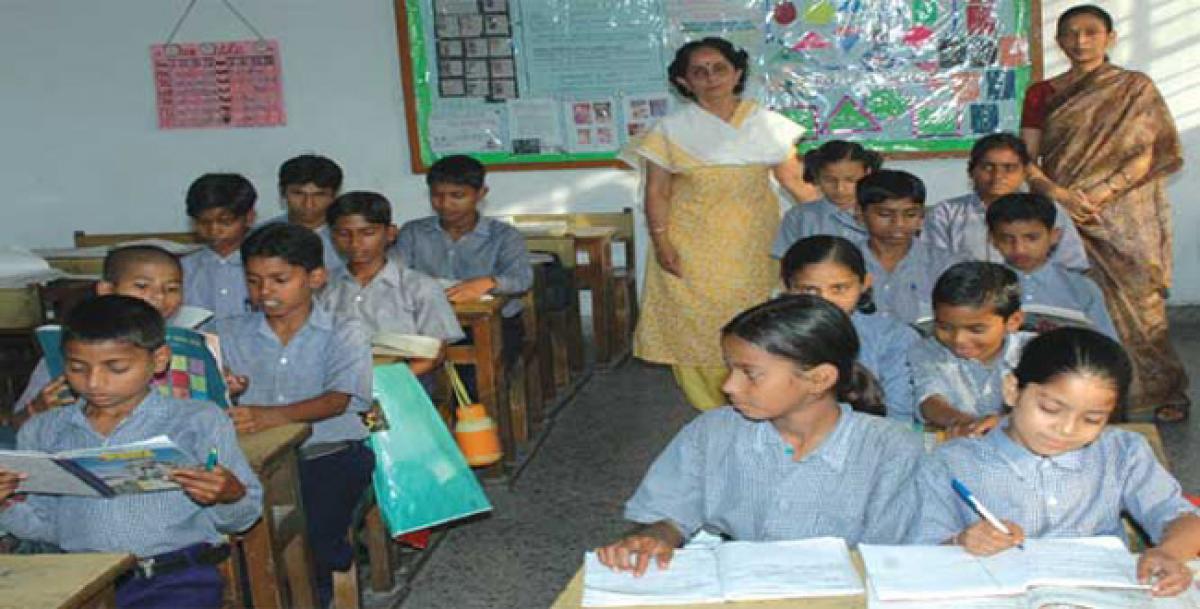Live
- Google Docs Introduces AI-Powered Clip Art Generator with Gemini
- LIC sets up stall at India Int’l Trade Fair
- Celebrating journalism and its role in society
- Supporting emotional well-being in children
- Govt plans 1 mn sq km oil exploration by 2030
- Empowering the future through quality education
- M4 MacBook Pro: Quantum Dot Display Enhances Colour and Motion Performance
- Three-tier probe on in Jhansi hospital blaze, says UP Dy CM Maurya
- ‘This is India’s century’, says PM Modi; urges all to aim for ‘Viksit Bharat’
- Crisil sees $7-trn GDP by 2031
Just In
Spending on education declines, quality of learning too!


Sarva Shiksha Abhiyan (SSA) -- a national programme for universal elementary education -- has seen Rs.1,15,625 crore ($17.7 billion) spent on it over the last five years -- but the quality of learning has declined.
Sarva Shiksha Abhiyan (SSA) -- a national programme for universal elementary education -- has seen Rs.1,15,625 crore ($17.7 billion) spent on it over the last five years -- but the quality of learning has declined.
For instance, only a fourth of all children in standard III could read a standard II text fluently -- a drop of more than 5 percent over five years, according to the 2014 Annual Status Report on Education (ASER).
The SSA received more than half the money (52 percent) in Finance Minister Arun Jaitley’s school-education allocation in the latest budget, but over the last five years, the SSA budget declined 6 percent -- from Rs.23,873 crore ($4.4 billion) in 2012-13 to Rs.22,500 crore ($3.3 billion) for 2016-17.
Education is primarily the responsibility of states, but the central government directly finances 60 percent of education, through programmes such as the SSA. As many as 66 percent of India’s primary school students attend government schools or government-aided schools -- the rest going to costlier private schools.
Of the money set aside for the SSA during 2015-16, only 57 percent was released till September 2015, according to an Accountability Initiative report.
While presenting his third budget earlier this week, Jaitley said nothing about the quality of education. The quality declines may be correlated with reduced funding, but they may not be caused only by a lack of money.
Less than one in five primary school teachers is adequately trained, IndiaSpend reported last year. The consequence is a marked decline in learning ability, in government and private schools.
The learning levels in government schools plummeted to a low of 41.1% in 2013 but recovered slightly to 42.2 percent in 2014, as IndiaSpend reported.
Similarly, with math, a quarter of children in standard III could not recognise numbers between 10 and 99, a drop of 13 percent over five years.
As much as 99 percent new elementary schools have been constructed of the 400,000 sanctioned since the launch of the programme in 2000-01 till September 30, 2015, according to this reply in the Lok Sabha (the lower house of Parliament) on December 7, 2015.
About 23 percent of schools surveyed by Accountability Initiative in 2015-16 needed to build at least one classroom in order to meet Right-to-Education norms. However, only 1 percent of schools received money from SSA during the financial year to construct new classrooms.
There are other gaps in the programme. The enrolment of girls has gone up from 48.12 percent in 2009-10 to 48.19 percent in 2014-15 at the elementary level. Many more girls clearly need to be enrolled. As many as 52 percent of boys are enrolled in primary schools.
The good news: Dropouts are down, highest in six to 14 age group
A 55 percent decline in dropouts was reported in the age group 6-14 years, from 13.46 million in 2005 to 6.1 million in 2013. The annual average primary school dropout rate declined from 6.8 percent in 2009-10 to 4.3 percent in 2013-14.
Mid-day meals in schools received Rs 9,700 crore ($1.4 billion), next only to SSA. About 102 million children across India in 2014-15 used the mid-day meal programme, the world’s largest school-feeding scheme.
As part of its rural initiatives, over the next two years, the government is also planning to open 62 new Navodaya Vidyalayas (New-age schools) in the districts without them.
The Navodaya Vidayalaya scheme was launched under the National Policy on Education 1986 to educate the best rural talent. There are 591 Navodaya Vidyalayas across India, according to data tabled in the Lok Sabha on December 7, 2015. Navodaya Vidyalaya Samiti, which runs these schools, was allocated Rs.2,471 crore ($400 million) -- an increase of 8 percent over last year.
Focus on higher education to strengthen infrastructure, but enrolments are low. The finance minister proposed setting up a Higher Education Financing Agency (HEFA) with an initial capital of Rs.1,000 crore ($146 million) to strengthen infrastructure in higher education.
The HEFA will be a not-for-profit organisation, which will use funds from the market and supplement them with donations and corporate social responsibility funds.
Higher education-including central and deemed universities-received the most money, Rs.7,997 crore ($1.2 billion), followed by the Indian Institutes of Technology (Rs.4,984 crore) and University Grants Commission (Rs.4,492 crore).
About 80 percent students were enrolled in undergraduate programmes, but only 0.3 percent (84,058 students) were enrolled for PhDs in 2012-13, a sign that research is weak and faltering, as IndiaSpend has reported.
Only 21 percent of young men and women aged 18 to 23 are enrolled for higher education. India’s enrolment rate in higher education is 18 percent below the global average of 27 percent and low compared to 26 percent in China and 36 percent in Brazil, a 2014 British Council report pointed out.
By Chaitanya Mallapur
(In arrangement with IndiaSpend.org, a data-driven, non-profit, public interest journalism platform, where Chaitanya Mallapur is a policy analyst. The views expressed are those of India Spend. The author can be contacted at [email protected])

© 2024 Hyderabad Media House Limited/The Hans India. All rights reserved. Powered by hocalwire.com






